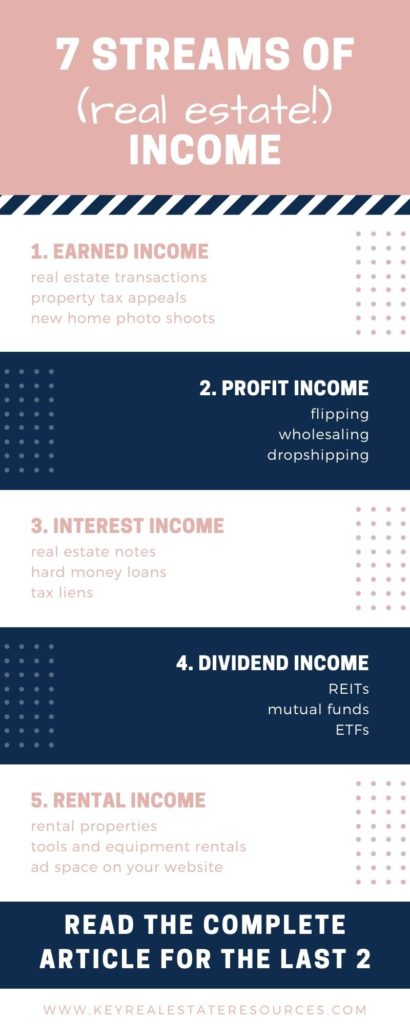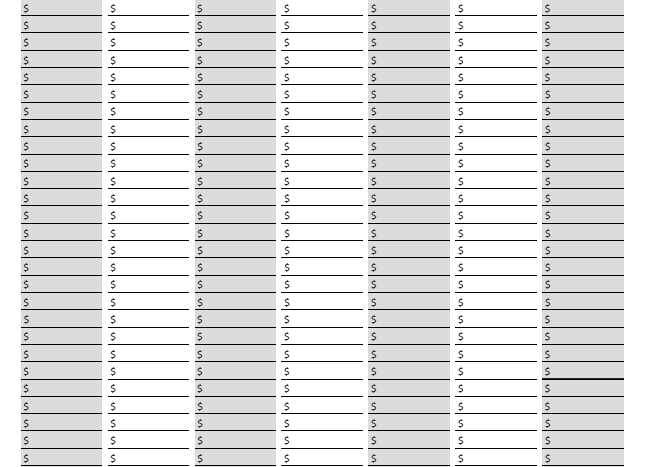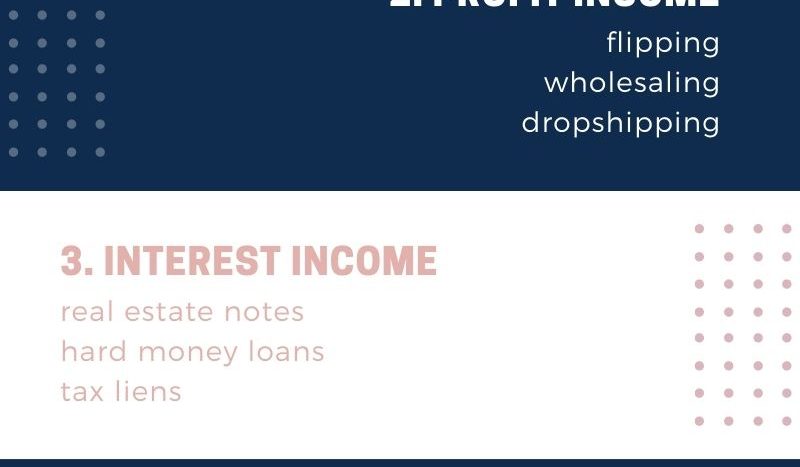You may have heard that the average millionaire has 7 streams of income.
Now, I don’t actually know if that’s true (no one seems to be able to cite any reliable source for that stat). But the idea that multiple streams of income build millionaires makes sense to me.
It’s dangerous to rely solely on the income from your job. Especially as a real estate professional, whose commissions naturally vary by season and by market strength. Why put all your eggs in one basket? Create your own 7 streams of income instead! When you diversify your income streams, you protect yourself against seasonal slumps and inevitable periods of recession.
So let’s take a closer look at each of the 7 streams of income.

7 Streams of Income for Recession-Proof Real Estate Agents
For each of the 7 streams of income, we’ll give you a quick overview, then dive into some specific examples, focusing on income streams that are a natural fit for real estate agents.
1. Earned Income
Earned income is the most common of the 7 streams of income. It’s the money earned from working a job.
So your earned income probably comes mainly from real estate transactions. But it doesn’t have to stop there.
Savvy agents are recession-proofing their real estate businesses by adding services to produce new earned income streams. And if you can add a service that’s in higher demand during a slow real estate market, you’re golden!
Property tax appeals are a prime example of an untapped revenue stream that’s perfect for real estate agents.
All you have to do is show the county that they are overestimating the value of your clients’ properties (which they almost always do in a declining real estate market). It just takes a simple property valuation (most states don’t even require an appraisal) and a presentation of your valuation findings to the county taxing authority. Quite often the valuation can even be presented via email or phone call!
Once the county sees that they were overestimating the property value, they’ll reduce the taxes for your client. Then you get a commission on that reduction.
The brilliance of adding this income stream to your business is that property tax appeals cycle inversely with real estate sales. When sales are up, there is less opportunity for tax appeals, but when sales are down because of a market downturn, tax appeal opportunity goes through the roof!
To learn more, check out How to Make Money with Property Tax Appeals.
Ideas for the earned income category of your 7 streams of income
In addition to real estate transaction commissions and property tax appeals income, consider these earned income streams, perfect for real estate agents:
- New home photo shoots
- Property management
- Staging
- Credit repair
- Transaction coordination
- Managing flips for out-of-area investors
- Real estate content writing
- Guiding local experiences
Of course you could also generate earned income from a second job, but I’m not a big fan of second jobs for real estate agents. Second jobs take too much time and focus away from your real estate business.
If you need more income than you’re currently able to earn from real estate transactions alone, you’re better off adding one of the services above to your real estate practice. You’ll be able to cross promote these services to gain new real estate clients, and you’ll cement yourself as a real estate professional (instead of being a barista/real estate agent).
2. Profit Income
Profit income comes from buying and selling. Buying and selling what, exactly? Well, anything, really!
In the context of being a real estate agent, buying and selling real estate is the first profit income stream that comes to mind.
Flipping homes is one of the most common forms of profit income in the world of real estate. You know the drill: you buy a fixer, invest in the renovation, and sell for a profit. In a market of rapid growth, when values are rising by the week, flipping can be a fun and profitable hobby. Just be prepared to invest some serious time and money into each flip.
I highly recommend FLIP: How to Find, Fix, and Sell Houses for Profit by Rick Villani for anyone who wants to learn more about flipping homes.
Ideas for the profit income category of your 7 streams of income
Remember, flipping isn’t limited to single-family homes. You could also flip commercial spaces or multi-family buildings as well.
And flipping isn’t the only way to make profit income in real estate. Consider these other options:
- Wholesaling: it’s like flipping purchase contracts. Basically, you find a great deal, get it under contract, then sell your contract to another investor for more than you originally agreed to pay. The difference is your profit income.
- Domain Names: you can buy inexpensive domain names and sell them for a higher price.
- Dropshipping: you don’t keep any physical inventory, but you facilitate the transaction between manufacturer and buyer and earn a profit. Check out Drop shipping: A Step By Step Guide On How To Make Money Online by Dan Moore if you’re interested in learning the ins and outs of drop shipping.
Of course you can also create a little profit income every time you need to de-clutter. Sell your stuff on sites like eBay or decluttr for a quick profit.

3. Interest Income
Interest income is income earned from lending money.
You may have seen a seller carry back (aka seller financing or OWC for “owner will carry”) in your real estate experience. This is when the seller acts as a mortgage lender, providing the financing for the buyer and collecting principal and interest for the term of the loan. If the buyer defaults at any point, the seller can foreclose to regain legal ownership of the property.
Seller carrybacks are an example of interest income. They’re earning interest by lending money to the buyer for the purchase of the home.
And you can do the same. If you have buyer clients who are having a hard time qualifying for a mortgage, and you’re willing and able to accept the risk, you could be your buyer’s lender. If they default, you can take ownership of the home and either sell it yourself or use it as a rental. This is commonly referred to as note investing.
Note Investing Made Easier: How To Buy And Profit From Distressed Mortgages by Martin Saenz is a good place to start learning about earning interest income through note investing.
Ideas for the interest income category of your 7 streams of income
Here are a few other ideas for earning interest income:
- Hard money loans: Hard money loans are similar to investing in real estate notes, but instead of being long-term mortgage loans, hard money loans are short-term (generally 6-24 months). Hard money loans might be used to fund a flip. You could issue a hard money loan to the flipper for the cost of the renovation at a whopping 10-15% interest rate. When the property sells, the flipper makes a tidy profit, and you earn exceptional returns.
- Tax liens: If your state is a tax lien state (as opposed to a tax deed state), you can buy a lien on the property at a predetermined interest rate. You’re not buying the property; you’re only buying a lien against the property. At tax lien auctions, investors typically aren’t bidding up on the value of the lien. The value is simply the amount of property taxes due. Instead, investors bid to see who will offer the lowest interest rate to the property owner for the lien.
The great thing about interest income is that it’s largely passive. Once you issue the loan, you just sit back and collect your income. The downside is that there can be a fair amount of risk, especially if the loan isn’t secured by real estate. Always do your homework before issuing your own loan to generate interest income.
4. Dividend Income
Dividend income is money earned on your stock portfolio.
If you’re not already investing some of your money in stocks and bonds, you should really consider starting. These are great long-term vehicles for building wealth, perfect for retirement savings or even long-term goals like launching your own brokerage or starting a charitable organization.
While it’s true that you could lose money on stocks in the short-term, over the long-term, balanced stock portfolios earn returns that rival real estate returns. And if you’re investing specifically for the dividend income, the growth on the share price of your stocks doesn’t matter so much anyway.
REITs (Real Estate Investment Trusts) are the industry standard for dividend income. By law, REITs are required to maintain dividend payout ratios of at least 90%. You can either accept your dividends as cash flow (ie dividend income) or reinvest the dividends to grow your investment faster.
To learn all about REITs, check out The Complete Guide to Investing in REITs – Real Estate Investment Trusts: How to Earn High Rates of Returns Safely by Mark Gordon.
Ideas for the dividend income category of your 7 streams of income
REITs are probably the best method for earning dividend income in the world of real estate, but there are a couple other options you could consider.
Like Real Estate Mutual Funds and Real Estate ETFs.
Real estate mutual funds are traded on the stock exchange. Instead of buying a share of a physical property, you’re buying a share of the fund. And the share of the fund is made up of multiple real estate investments hand-picked by the fund manager. These investments typically include REITs and real estate-related stocks.
The great thing about mutual funds is that they provide some instant diversification. Instead of putting all your eggs in a single basket, buying a share of a mutual fund automatically puts your eggs in multiple baskets. If one stock tanks, hopefully the fund as a whole will be buoyed by the other stocks in the fund.
Just know that all the investments in your mutual fund will be real estate related. So if the real estate market as a whole is declining, your mutual fund value will likely decline as well. But when the real estate market is booming, your funds should perform exceptionally well.
Real estate ETFs (Exchange-Traded Funds) are very similar to real estate mutual funds. There are just a couple key differences:
- ETFs trade on the stock market all day long, while mutual funds only trade at the end of the day for the net asset value (NAV) price.
- ETFs generally follow an index, so they aren’t hand-picked by an active manager like mutual funds are. This means ETFs have lower expenses than mutual funds.
- ETFs don’t have an investment minimum.
If you’re looking for a low-expense, easily-liquid way to generate dividend income, ETFs may be the vehicle for you.
The Little Book of Common Sense Investing by John C. Bogle is a great place to build an education in investment portfolio products like mutual funds and ETFs.

5. Rental Income
Naturally, rental income comes from renting out your assets. Among the real estate crowd, rental income is probably the 2nd most common of the 7 streams of income (only behind earned income).
Real estate agents know the value of real estate better than most people, so of course agents are quick to invest in real estate, particularly in the form of rental properties.
The great thing about rentals (real estate rentals in particular) is that you can make money in multiple ways:
- Appreciation (also called capital gains, which is an income stream we’ll get to next!)
- Renters are paying down your debt
- Renters are also putting money in your pocket
- You get to take advantage of tax breaks
If you haven’t already started investing in rental properties, check out 5 Clever Real Estate Investment Strategies for Beginners for some genius ways to get started.
Ideas for the rental income category of your 7 streams of income
Single-family homes are the most common rental income stream. But you can get creative here.
- Consider different property types: commercial, industrial, or multi-family.
- Your unused spaces: rent out a room, a storage space, or a parking space
- Short-term vacation rentals
- Tools and equipment
- Ad space on your website
So many different options for rental income!
6. Capital Gains
Capital gains are the value increases of your assets. So it may not be cash in your pocket, but capital gains still grow your net worth.
It’s easy to see capital gains in real estate. As your property appreciates, you benefit from the increase in value.
But of course there are lots of different ways to generate capital gains.
Ideas for the capital gains category of your 7 streams of income
Any time you purchase an asset (something that will grow in value over time), you’re contributing to your capital gains income stream. And these assets can be almost anything:
- real estate (even vacant land will likely grow in value)
- stocks
- your business: build a solid business model and client list, and you could sell them one day
- art and other collectibles
I recommend tracking your net worth year-over-year so you can watch your net worth grow as your assets generate capital gains.
7. Royalties
Royalties are a form of passive income, where you earn money by allowing others to use your work.
Many real estate agents never even consider adding royalties to their income streams. It just doesn’t occur to most people that you could earn income in perpetuity for something you create once.
Books are the most common way for real estate agents to create royalties income. It’s easier than ever to earn royalties on a book of your own, thanks to the popularity of eBooks and self-publishing. And there are several other options available in the digital age.
Ideas for the royalties category of your 7 streams of income
Think about the knowledge you have and the things you’ve created to make your life easier. If you can productize these things, you’ll be able to jump-start your own royalties income stream. Here are a few ideas, aside from books, to get you started:
- Courses: investor courses, new agent courses, social marketing courses, etc
- Templates and printables: you can sell these digital products on Etsy 24/7!
- Stock photos and videos: people need images and video for their websites and digital channels. Why not make some money on the pictures and videos you’ve already taken?
The best thing about royalty income is that you get paid round the clock for years into the future for something you did once. Just this past weekend, I was off celebrating my anniversary at a castle in Germany when I got a notification that another copy of my Ultimate Real Estate Blog Content Calendar sold. Not only does royalty income allow you to buy another round of drinks at a castle bar, but if you build up enough products, you could fund an early retirement with royalties income!

Do You Need All 7 Streams of Income?
So we just covered the 7 streams of income, but here’s the thing: you don’t need to have income from each of these 7 categories. Create your own Millionaire Mix of 7 streams of income.
You might have 2 different streams of income from the same category. Maybe your earned income consists of real estate transactions and property tax appeals. Awesome! You already have 2 streams of income. So you can skip one of the other categories (like interest income, which is less fun!).
The goal is to create 7 streams of income. They can come from any combination of categories you want as long as they are 7 different income streams.
So what’ll it be? Which 7 streams of income are going to make you a millionaire?
Quick PS:
If you need a quick and easy way to track the income from your 7 streams, check out The 7 Streams of Income Tracker, available for a limited time on Etsy.
Get Your Complete Recession-Proof Guide!
If you’re serious about growing your real estate business during a slow market, check out The Recession-Proof Real Estate Agent. This book offers a complete step-by-step guide to recession-proofing your real estate business.











